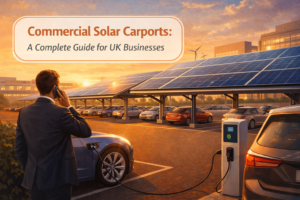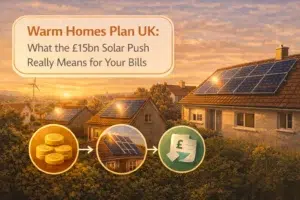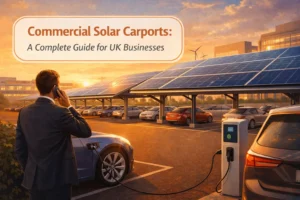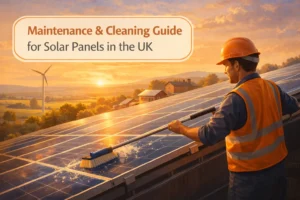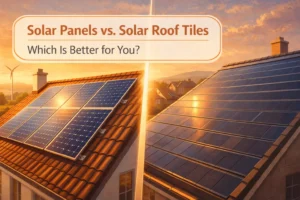Are Solar Panels Worth It in the UK? (2025)

Written By
Published on
- 26 May 2025
Are Solar Panels Worth It in the UK? Expert Guide with Real 2025 Savings
Solar panels in the UK – are they worth your money? More than 1.5 million homes now use solar energy, and homeowners keep switching to this renewable power source, and with good reason too.
Solar panel systems give you impressive financial perks beyond their environmental benefits. Your electricity bills could drop by £400 to £1,110 each year, based on your system size and power needs. The system pays for itself quickly – just over eight years on average, while some setups break even in five years. The Smart Export Guarantee lets you earn extra cash by selling unused electricity back to the grid, which boosts your returns further. Modern solar panels work efficiently for 30-40 years, so you’ll see decades of profit after breaking even.
This detailed guide gets into whether solar panels make sense as an investment in 2025. We’ll look at the costs, potential savings, and ways to get the most value from your setup in the UK climate.
Is solar worth it in the UK in 2025?
The UK solar industry is booming in 2025, and homeowners want to know: are solar panels worth it in the UK right now? The answer is simple – yes. Solar energy has never been a better investment for UK properties than today.
Why solar is gaining popularity
Solar power has hit record-breaking levels in the UK. March 2025 saw over 21,000 installations – the highest monthly total since December 2015. This isn’t just a temporary spike. UK residents strongly back solar energy, with 77% supporting solar development in their neighborhoods.
The surge comes from cheaper technology and growing energy awareness. Homeowners now realize that solar panels provide great long-term value, even with the UK’s changing weather. The numbers tell the story – the first quarter of 2025 saw over 57,000 certified installations, reaching levels not seen since 2012.
Battery storage technology has changed how people use solar energy. About 30% of new solar setups now include battery storage, up from just 10% five years ago. You can now store extra energy from sunny hours and use it after dark, which makes your investment much more valuable.
How UK weather affects solar performance
Your solar panels work well despite the UK’s cloudy reputation. They don’t need direct sunlight to generate power – both direct and scattered light works fine. Panels still produce 10-25% of their usual output on cloudy days.
Modern systems get the most out of low light conditions, though winter days generate less power due to shorter daylight and more clouds. The UK’s mild summer temperatures actually help because too much heat reduces panel efficiency.
Output changes with seasons. A typical winter day produces about one-eighth of a June day’s energy. Looking at yearly generation makes more sense than focusing on seasonal ups and downs when calculating payback time.
Rain helps keep your panels clean by washing away dust and debris. Well-designed systems take the UK’s weather patterns into account and deliver steady power throughout the year.
Common misconceptions about solar panels
People often hesitate to get solar panels because of these common myths:
Myth 1: “Solar panels don’t work in cloudy Britain”
Reality: Panels create electricity from daylight, not just direct sun. They keep working in overcast conditions, just at lower levels.
Myth 2: “Solar panels are too expensive”
Reality: Prices have dropped by over 88% since 2010. The Smart Export Guarantee and long-term savings make solar a smart financial choice.
Myth 3: “Solar panels require constant maintenance”
Reality: These systems need very little upkeep. About 70% of owners report no technical issues since installation.
Myth 4: “Solar panels only work during hot weather”
Reality: Panels work better in cool weather. The UK’s moderate climate suits them well because extreme heat reduces their output.
Solar technology works great across the UK, whatever the weather or location. A properly sized system provides clean, reliable power for decades. You get environmental benefits and true energy independence for your home.
How much do solar panels cost in the UK?
Average cost by system size
Solar panel system prices change based on your property size and energy needs. Small homes work well with 2-3kW systems. Larger properties need 5-6kW setups.
A typical 4kW system costs between £6,500 and £8,000, which fits perfectly for an average UK three-bedroom home. This size balances the upfront cost and potential long-term savings.
The price range for 3kW systems sits between £5,000 and £6,500. Larger 6kW systems for spacious detached homes cost £9,500 to £10,500. Your property type determines both your system needs and investment amount.
The good news? Solar panel prices keep falling. The average cost per kilowatt for UK solar panel systems dropped 4.5% between March 2024 and 2025. This makes solar power available to homeowners with different budgets.
Installation and equipment breakdown
A closer look at solar panel costs shows where your money goes. The panels make up about one-third of the total system cost. To name just one example, in a £7,300 system, the solar panels cost around £2,450.
Installation takes 25-30% of your total investment. This covers labor (£300-£500 daily), support structures, and specific mounting needs. The rest pays for key parts like inverters (about £900 for a standard 4kW model), mounting brackets, and electrical equipment.
Your system’s design affects the overall cost. The roof’s complexity, angle, and shade can influence equipment choice and installation difficulty. Monocrystalline panels with 15-20% efficiency cost more than polycrystalline options that offer 13-16% efficiency.
Cost with and without battery storage
Battery storage marks a big decision in your solar setup. A standard solar battery costs £4,000 to £5,000 for an average UK home. This higher initial cost improves your solar panel return on investment. You can use about 30% more of your generated electricity.
A 4kW solar system without storage costs £6,500-£8,000. The same system with battery storage runs between £10,000 and £14,000. Battery sizes match your household needs. Small 4kWh units start at £4,000. Larger 10kWh systems might reach £8,000.
Battery storage changes your solar panel payback time. It adds 2-3 years to the break-even period. However, it gives you more energy independence and shields you from rising electricity prices over time.
The complete solar package prices tell the story clearly. A typical three-bedroom house needs a 4.5kW system with battery storage at £9,800. A larger four-bedroom home might need £13,000 for a 6kW system with proper storage.
Solar panel payback time and ROI explained
What is the average payback period?
You’ll break even on your solar investment in 5-14 years in the UK, depending on various factors.
Your location makes a big difference in how quickly you’ll see returns. London homeowners might break even in about 10 years. Edinburgh residents might need to wait another year. This happens because southern parts of the UK get more sunlight throughout the year.
Yes, it is true that your daily habits can change these timeframes quite a bit. People who stay home during the day see returns 1-2 years faster than those who are only home in the evenings. They use more power while the sun shines instead of sending it back to the grid.
The size of your system changes how quickly you’ll profit. Bigger systems give you better value. A 10kW system might give you 10% returns, while a smaller 2kW setup yields about 5%.
Real-life ROI examples from UK homes
Real examples show what you can expect to earn. A typical 3.5kW system in southwest England saves about £600 each year. Over 25 years, as electricity prices go up, you could save around £18,000.
Take Sheffield as an example. A 4kW system there might pay for itself in just 6 years without battery storage. Suffolk homes do even better—some systems there break even in just 5.2 years.
Adding batteries makes the deal even sweeter. In Glasgow, a 5.2kW system with a battery pays for itself in 8 years instead of 9. Batteries help you use 80% of your power instead of just 50%.
How solar compares to other investments
Solar panels stack up well against regular investments. The best savings accounts in early 2025 paid about 5.5% interest. A good solar setup gives you around 9%.
Solar investments come with extra perks. You won’t pay tax on the money you save. Your returns keep pace with inflation because electricity prices usually rise faster than other costs. Solar power costs about 9p per kWh—much less than grid electricity at 27p and climbing.
The numbers get better with bigger systems. Quality installations can give you 10-16% returns. Large 30kW systems might even reach 14%.
Unlike the stock market, solar panels give steady returns based on sunlight—something we can count on. Your savings grow as energy prices rise, protecting you from future price hikes.
The best part? Solar panels keep saving you money long after they’ve paid for themselves. Most systems last 25-30 years, giving you 15+ years of pure savings after breaking even.
What affects your solar panel savings?
Several important factors help determine if are solar panels worth it in UK homes. You should understand these variables to get the most from your investment before and after installation.
Your location and roof orientation
The amount of sunlight varies throughout the UK. Southern regions get more direct sunshine. London properties reach payback about 2 years faster than those in Belfast with similar systems. Solar remains a viable option nationwide with proper configuration.
Your roof’s orientation plays a crucial role in energy production. South-facing roofs get maximum sunlight during the day, making them perfect for solar panel placement. East-west facing setups can work well too. They provide balanced energy generation from morning to evening that may better match your home’s power needs.
Your daily energy usage habits
The way you use electricity affects your solar savings. Homes with people present during daylight hours reach payback faster by using power as it’s generated. Families at home during mornings or afternoons see different returns based on their panels’ peak production times.
Moving power-hungry tasks like laundry, dishwashing, or EV charging to daylight hours will boost your self-consumption rate. This means you’ll use more solar electricity instead of sending it back to the grid.
System size and panel efficiency
The right system capacity based on your electricity needs will give optimal performance. Systems that are too big may create excess energy with diminishing returns, especially without batteries. Small systems might not cut your grid electricity use enough to matter.
Panel efficiency—the rate at which panels turn sunlight into electricity—ranges from 18-24% for quality home systems. More efficient panels need less roof space to generate the same power. This makes them valuable for homes with limited installation area.
Impact of shading and roof pitch
Shade can slash your solar output. A panel in partial shade loses up to 80% of its potential generation and affects the system’s overall performance. Trees, chimneys, nearby buildings, or satellite dishes create shadows that change throughout the day and seasons.
Your roof’s pitch matters for energy capture. UK homes need angles between 30-40 degrees to get maximum direct sunlight. Steeper 50° angles work better in winter when the sun sits lower, while 30° angles maximize summer production.
Professional installers look at these factors during site surveys. They recommend the best panel placement, ways to reduce shade problems, and right system size. This ensures your installation delivers maximum returns for years to come.
How to increase your solar return
Maximizing your solar investment is simple. You can boost your returns with several easy strategies that make are solar panels worth it in UK homes an obvious yes.
Using appliances during daylight hours
Your electricity consumption should align with sunny periods to improve your solar panel return on investment. The original step is to spot power-hungry appliances like washing machines, dishwashers, and tumble dryers. You can then adjust your routine to run these during peak sunlight hours—usually around midday.
Here are some practical tips:
- Run large appliances one at a time to avoid grid electricity
- Set timers to run appliances while you’re away
- Use slow cookers during daylight hours to prepare evening meals
- Set lower temperatures on washing machines and dishwashers
You can power more activities with your solar generation by spacing out high-energy tasks throughout the day. Let your washing machine finish before you start the dishwasher.
Adding battery storage
Battery systems reshape the scene of your solar panel payback time by storing extra daylight power for evening use. Your excess electricity goes to the grid without storage—often at rates lower than what you pay to import energy later.
Modern batteries help your solar setup provide up to 70% of your yearly electricity needs, compared to systems without storage. These advanced batteries also work during outages, which adds security during disruptions.
Batteries become more economical over their lifespan as electricity costs rise. This works best for homes that use most of their energy in the evening.
Choosing the best SEG tariff
Smart Export Guarantee (SEG) tariffs differ among providers. Some suppliers now offer rates above 30p/kWh during peak hours, which is a big deal as it means that your return increases. You should compare standard rates and time-dependent options.
Some suppliers pay more for solar exports during busy evening periods (usually 4-7pm). Battery storage lets you export strategically during these premium hours to earn more.
Monitoring and optimizing usage
Energy monitoring tools show exactly when you generate and use electricity. These insights help you find ways to improve your solar performance. You can make better decisions about appliance use by tracking your patterns.
Regular maintenance keeps your system running well. Clean panels and trim surrounding plants to avoid shade. Schedule professional system checks every few years to maintain efficiency.
Note that small changes in how you use electricity add up to big savings. Your system’s financial and environmental benefits will grow as you manage your electricity use more effectively.
Incentives, and long-term value
Solar installations deliver more than just quick energy savings. They add significant long-term value to your property, which makes the question “are solar panels worth it in UK” even more relevant.
How solar panels increase home value
Solar technology definitely adds to your property’s worth. Research backs this up with studies showing home value increases from 0.9% to 7.1%. An average UK home valued at £298,083 could see a jump of £2,682 to £21,163 in market value.
Your home’s value gets a boost mainly through better Energy Performance Certificate (EPC) ratings. Adding solar panels typically raises your EPC score by about 18 points. This improvement often pushes your rating up by one full grade. A single EPC grade improvement can add £10,000 to your home’s market value.
The real estate market has noticed these advantages. About 69% of buyers say they’re “likely” or “very likely” to buy homes with solar panels. This shows how buyer priorities are moving toward energy-efficient homes ready for the future.
Environmental benefits and carbon savings
Solar power brings impressive environmental advantages alongside its financial returns. A standard solar setup cuts your household’s carbon footprint by about 1.1 tons of CO2 each year. That’s a 31% reduction. Your panels could prevent up to 20 tons of carbon emissions during their lifetime.
Solar energy stands out from traditional power sources by producing clean electricity without pollution or waste. This leads to:
- Better air quality and public health
- Less water use compared to regular power generation
- Protection from future carbon tax policies
Solar farms can help local wildlife when planned well. These sites create space for wildflower meadows that help pollinator populations grow, which benefits the whole ecosystem.
Your investment in solar panels makes sense financially and helps tackle climate issues. So when you look at solar panel return on investment and solar panel payback time, note that the benefits go way beyond lower electricity bills.
Conclusion
Final Thoughts: Are Solar Panels Worth It?
Solar panels are a solid investment for UK homeowners. This piece has shown how these renewable energy systems give great returns despite the UK’s changeable weather. Your decision to install solar panels makes both environmental and financial sense.
The answer to “are solar panels worth it in the UK” is a clear yes. The payback comes quickly, and you’ll get decades of free electricity after that. The Smart Export Guarantee lets you earn money from excess energy, which makes these systems even more valuable.
Solar power gives you energy independence. You’ll depend less on regular energy providers and stay protected from unexpected price hikes. This means more control over your energy costs while helping the environment.
Solar technology has grown by leaps and bounds over the last several years. Today’s panels work well even on cloudy days. This proves wrong the old belief that UK weather isn’t right for solar energy. Battery storage systems have changed how we use solar power. They keep your self-generated electricity ready when you need it most.
Your property value goes up with solar panels. More buyers now look for homes with renewable energy systems. This makes your investment worthwhile if you decide to sell later.
Your choice to go solar helps beyond your home. Every solar installation cuts carbon emissions and helps create a healthier planet. Going solar means fighting climate change while getting practical benefits.
These systems need very little upkeep once they’re in place. They keep working reliably for decades. Without doubt, this makes solar power perfect for busy homeowners.
Now is the perfect time to tap into the potential of solar energy in the UK. The original cost needs some thought, but the long-term benefits are worth more than what you pay upfront. Making this choice today creates a future of sustainable living and savings that will last for years.
FAQs
Q1. Are solar panels a worthwhile investment in the UK climate? Yes, solar panels are a worthwhile investment in the UK. They can significantly reduce energy bills, with potential annual savings of £400-£1,110 depending on system size and energy usage. The average payback period is just over eight years, with some systems breaking even in as little as five years. Solar panels continue to generate electricity even on cloudy days, typically producing 10-25% of their maximum capacity in overcast conditions.
Q2. How much can I save on electricity bills with solar panels? Solar panel savings vary depending on factors like system size, energy usage, and location. On average, UK homeowners can save between £400 and £1,110 annually on electricity bills. Adding battery storage can increase these savings by allowing you to use approximately 80% of your generated electricity, compared to just 50% without storage.
Q3. Do solar panels increase property value in the UK? Yes, solar panels can increase property value in the UK. Studies show that homes with solar installations can see value increases ranging from 0.9% to 7.1%. For an average UK home worth £298,083, this could mean a potential boost of £2,682 to £21,163. Additionally, solar panels typically improve a home’s Energy Performance Certificate (EPC) rating, which can further enhance its market value.
Q4. What is the typical lifespan of solar panels in the UK? Quality solar panels in the UK typically last 25-30 years, with some high-quality systems maintaining efficient performance for up to 40 years. Most panels will still produce about 87% of their original output after 30 years. However, inverters usually need replacement after about 12 years, which should be factored into long-term planning.
Q5. Can I completely eliminate my reliance on grid electricity with solar panels? While it’s possible to significantly reduce your reliance on grid electricity, going completely off-grid requires careful planning and a robust system. For an average UK home, this typically means installing 8-10 solar panels along with sufficient battery storage to maintain power during nighttime and less sunny periods. You’ll also need to carefully manage your energy consumption and possibly incorporate additional renewable sources to achieve complete energy independence.

